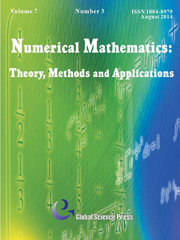No CrossRef data available.
Article contents
A Posteriori Error Estimates of Mixed Methods for Quadratic Optimal Control Problems Governed by Parabolic Equations
Published online by Cambridge University Press: 28 May 2015
Abstract
In this paper, we discuss the a posteriori error estimates of the mixed finite element method for quadratic optimal control problems governed by linear parabolic equations. The state and the co-state are discretized by the high order Raviart-Thomas mixed finite element spaces and the control is approximated by piecewise constant functions. We derive a posteriori error estimates for both the state and the control approximation. Such estimates, which are apparently not available in the literature, are an important step towards developing reliable adaptive mixed finite element approximation schemes for the control problem.
Keywords
- Type
- Research Article
- Information
- Numerical Mathematics: Theory, Methods and Applications , Volume 4 , Issue 4 , November 2011 , pp. 439 - 458
- Copyright
- Copyright © Global Science Press Limited 2011


